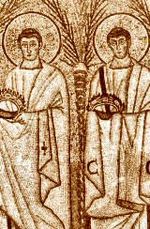Protus and Hyacinth
| Saints Protus and Hyacinth | |
|---|---|

Saints Protus and Hyacinth
|
|
| Martyrs | |
| Born | 3rd century |
| Died | c. 257–9 Rome |
| Venerated in | Roman Catholic Church; Coptic Church, Eastern Orthodox Church |
| Major shrine | San Giovanni dei Fiorentini, as well as the chapel of the Propaganda College. Both in Rome. |
| Feast | September 11 (Roman Catholic Church), December 24 (Eastern Orthodox Church) |
| Attributes | Depicted as two young men, holding the crowns of martyrdom |
Saints Protus and Hyacinth were Christian martyrs during the persecution of Emperor Valerian (257–259 AD). Protus' name is sometimes spelled Protatius, Proteus, Prothus, Prote, and Proto. His name was corrupted in England as Saint Pratt. Hyacinth is sometimes called by his Latin name Hyacinthus (in French: Hyacinthe; Spanish: Jacinto; and Italian: Giacinto).
The day of their annual commemoration is mentioned in the "Depositio Martyrum" on September 11, in the chronographia for the year 354. The chronographia also mentions their graves, in the Coemeterium of Basilla on the Via Salaria, later the Catacomb of St. Hermes. The "Itineraries" and other early authorities likewise give this as their place of burial.
Tradition holds that Protus and Hyacinth were brothers. They served as chamberlains to Saint Eugenia, and were baptized along with her by Helenus, Bishop of Heliopolis. Devoting themselves zealously to the study of Sacred Scripture, they lived with the hermits of Egypt and later accompanied Eugenia to Rome. There, they were arrested for their Christianity by Emperor Gallienus (260–268). Refusing to deny their faith, they were first scourged and then beheaded on September 11.
...
Wikipedia
